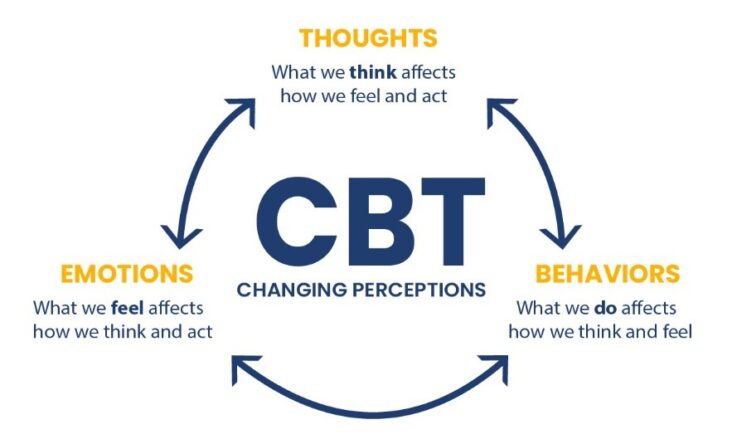In this write-up, we will look at the potential benefits of Cognitive Behavioral Therapy (CBT), and how it can potentially help you in creating a better future. We’ll study the essentials of CBT, how to bring about constructive transformation, and the perks of embarking on this voyage of self-discovery. We will also recognize the obstacles to making this shift and the best way to conquer them. You should be on your way to enhancing your life and feeling more fulfilled once you possess an improved grasp of this robust healing technique. With CBT, you could unlock a more promising tomorrow for yourself. Continue reading to uncover additional information on how this therapy can assist you in becoming the utmost version of yourself.
What is Cognitive Behavioral Therapy?
Cognitive Behavioral Therapy (CBT) is a type of psychotherapy that concentrates on aiding people to identify and change their unhelpful thought processes and habits. There are many issues that can be treated with CBT, ranging from tension and depression to addiction, eating disorders, and relationship issues. CBT helps individuals cultivate the skills necessary to manage their emotions, recognize negative thoughts, and modify how they think and behave. CBT alters maladaptive behaviors and creative problem-solving techniques and enhances self-esteem. Combined with other forms of psychotherapy, such as interpersonal therapy, CBT is an effective treatment method.
History of Cognitive Behavioral Therapy
CBT emerged during the 1960s and originated in the work of psychiatrist Aaron Beck. He noticed that some forms of thought were associated with mental issues. Beck described these as “automatic negative ideas” and produced the tactic of cognitive therapy. Currently, it is one of the most examined types of therapy. Research has demonstrated that it is beneficial in managing an array of psychological issues, such as uneasiness, depression, eating ailments, sleeplessness, obsessive-compulsive disorder, panic disorder, post-traumatic stress disorder, and substance use disorder.
Types of Cognitive Behavioral Therapy
CBT incorporates various approaches and strategies that address our feelings, actions, and thinking. These can range from formal psychotherapies to self-care measures. Whereas every kind of cognitive behavioral therapy utilizes a distinctive technique, all of them strive to confront the basic thought processes that lead to mental anguish. A few of the particular methods of psychotherapy which involve cognitive behavioral therapy consist of
- Cognitive Therapy: It focuses on uncovering and altering mistaken or skewed thought processes, emotional reactions, and activities.
- Dialectical Behavior Therapy (DBT): Itdeals with pernicious or unsettling ideas and actions while encompassing therapy approaches like emotional control and awareness.
- Multimodal therapy: It proposes coping with mental difficulties through seven different yet interconnected modalities: conduct, emotion, sensation, mental picture, thought, social components, and drug/biological elements.
- Rational Emotive Behavior Therapy (REBT): It necessitates recognizing irrational convictions, vigorously contesting these convictions, and eventually grasping and altering these thought processes.
Cognitive Behavioral Therapy Techniques
CBT is about more than recognizing thought processes. It employs a broad selection of techniques to assist individuals in overcoming these habits. Below are some of the approaches used in cognitive behavioral therapy.
- Identifying Negative Thoughts: It is essential to comprehend what emotions, sentiments, and circumstances add to unhelpful conduct. Be that as it may, this activity can be challenging, particularly for those battling self-reflection. In any case, investing the energy to recognize these musings can likewise prompt self-disclosure and furnish an understanding that is fundamental to the remedial procedure.
- Practicing New Skills: In cognitive behavioral therapy, individuals are often taught new techniques that can be applied in actual situations. For instance, someone suffering from a substance use disorder may train new managing abilities and practice methods to dodge or confront social scenarios that could possibly bring about a relapse.
- Goal-Setting: It can be a crucial component of psychological recovery, assisting you to make changes to improve your well-being and quality of life. During cognitive behavioral therapy, a specialist can assist you in constructing and fortifying your goal-setting capabilities.
- Self-Monitoring: It is a vital cognitive behavioral therapy approach. It necessitates monitoring behaviors, indications, or experiences over time and conveying them to your psychotherapist.
Benefits of Cognitive Behavioral Therapy
- CBT assists you in forming more beneficial mental attitudes by recognizing the pessimistic and frequently unrealistic thoughts that suppress your emotions and states of mind.
- It is an effective short-term treatment as outcomes can generally be observed in five to 20 sessions.
- It is successful for a large number of detrimental habits.
- In many cases, it is more cost-effective than other forms of treatment.
- It can be employed for those who do not necessitate psychotropic medication.
- CBT assists people to develop coping skills that can be utilized in the present and also in the days ahead.
Effectiveness of Cognitive Behavioral Therapy
- Studies suggest that cognitive behavioral therapy is the most supported, evidence-based remedy for eating disorders.
- CBT has been demonstrated to be beneficial for people with sleep deprivation, as well as those with a medical issue which impedes rest, including those suffering from pain or affective disorders such as depression.
- CBT has been empirically demonstrated to be effective in managing signs of depression and anxiety in kids and teenagers.
- A 2018 review of 41 studies revealed that CBT was efficient in alleviating indications in individuals who had anxiety and anxiety-related conditions, such as obsessive-compulsive disorder and post-traumatic stress disorder.
Cognitive Behavioral Therapy is a potent resource that can assist people in ameliorating their lives and constructing a better destiny. It can direct us to acknowledge and confront our adverse thinking styles and behaviors, and to exchange them with more favorable and constructive ones. With the assistance of a competent therapist, Cognitive Behavioral Therapy can be a productive and long-standing treatment for numerous mental health problems. It can also be utilized as an effective way to construct healthier relationships and augment self-consciousness and sympathy. Cognitive Behavioral Therapy can also be used to help individuals regulate stress, confront difficult circumstances, and attain superior general mental health and well-being.

